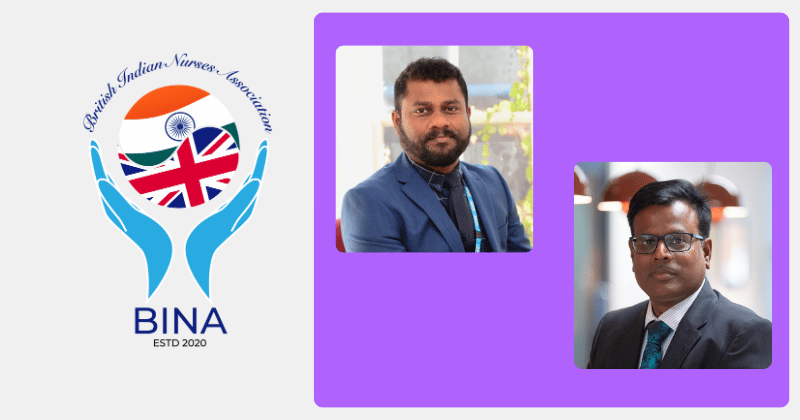
For many healthcare workers who move overseas, the process of settling in and getting to know your new home can be overwhelming and isolating. That’s why the work of disapora groups like the British Indian Nurses Association (BINA) is so important. In honour of South Asian Heritage Month we asked Marimouttou Coumarassamy, Founder and Chairman of BINA, and Suresh Packiam, General Secretary and Founder of BINA, to share their advice with our global candidate audience.
Here are their five essential tips to help make your transition smoother and more successful.
1. Research and prepare before you arrive
One of the most significant challenges new arrivals encounter is the difference between expectations and reality, particularly regarding the cost of living.
Suresh Packiam emphasised the importance of thorough research before moving:
“While planning your finances, such as how much you will manage to save from your salary, it is essential to budget carefully for all your monthly expenses, including rent, bills childcare, and groceries.”
- Suresh Packiam
For example, the cost of renting will likely be your biggest monthly expense, and in the north of the country, it can be considerably lower than in the south, specifically in London. It’s crucial to understand the local living costs, including rent, food, and childcare so you can manage your household budgets and reduce financial stress.
As part of your research use online resources like real estate websites (such as Rightmove, Zoopia and Spareroom), talk to people already living in the UK, and have detailed discussions with your recruitment company or/and future employer to set realistic expectations.
2. Start solo, then bring your family
Moving to a new country is challenging enough without the added pressure of immediately supporting a family. Both Suresh and Marimouttou recommend that healthcare professionals first come alone and spend at least six months getting settled.
"They’re able to focus on the OSCEs, explore and integrate in a local community, find good accommodation they can afford, look at schools, and figure out how their family may settle in...”
- Marimouttou Coumarassamy
This period allows you to focus on your OSCE exams, secure your PIN, find suitable accommodation, and understand the local community and safety for your family. Once you are more established and confident, it will be easier to make arrangements and decisions about topics like housing, education, and settling your family in their new home.
3. Connect with local communities and groups
Feeling isolated is a common issue for many new arrivals. Marimouttou suggests joining local cultural and religious groups to find a sense of community and make local contacts
BINA, for instance, helps new arrivals connect with Tamil, Malayali, and other cultural groups, as well as local churches and community gatherings. They also facilitate WhatsApp groups for different UK regions, making it easier to share information and support.
To find such groups in your area, you can search online, check local community centres, or ask colleagues from your trust who can often provide valuable advice and recommendations.
4. Understand and adapt to cultural differences
Cultural differences can be a significant barrier for many, and it’s essential to try to understand British culture so you can acclimatise. As Suresh pointed out, understanding local slang and colloquial language can boost your confidence and help you communicate more effectively.
To better understand the language, culture, and day-to-day life in your new country, immerse yourself in local content. Reading books, watching TV shows, and following local news can help you grasp colloquial language and cultural nuances.
Tip: A recommended book is "Watching the English" by Kate Fox, which provides humorous and insightful observations about English social behaviours and cultural norms.
5. Speak up and seek support
In the UK, healthcare professionals are expected to work collaboratively and communicate openly, which can be different from the hierarchical structure some are used to. In the UK system, for example, nurses are encouraged to challenge doctors if they believe there is an issue with patient care. This is part of a collaborative, multi-disciplinary approach to healthcare where every team member's voice is valued.
Don’t be afraid to voice your opinions and ask questions. BINA provides mentoring and career coaching to help you navigate these differences.
Take advantage of professional development resources and seek advice on how to advance in your career from both diaspora groups and within your Trust.
Read more: Leading with resilience: Sanjith’s journey from India to the NHS
6. Ask for help
It is always okay to ask questions, even about topics not related to your work. Your employer and colleagues are interested in your successful onboarding and settling in, so your questions are welcome.
Suresh shared a story of new arrivals who did not know how to turn on the heating in their accommodation. Initially, they were hesitant to ask for help, but once they reached out, they received the support they needed to be comfortable. This demonstrates the importance of seeking help when needed. By doing so, you can overcome small challenges quickly and focus on your new role.
Adapting to a new country and healthcare system is no small feat but can also be an adventure and incredibly rewarding professionally and personally. By doing your research, connecting with local communities, understanding cultural differences, and seeking support, you can make the transition smoother and more enjoyable.
For more information and support, visit the British Indian Nurses Association (BINA) website. Stay connected, stay informed, and most importantly, don't be afraid to reach out for help when you need it.
Welcome to the UK, and best of luck in your new journey!